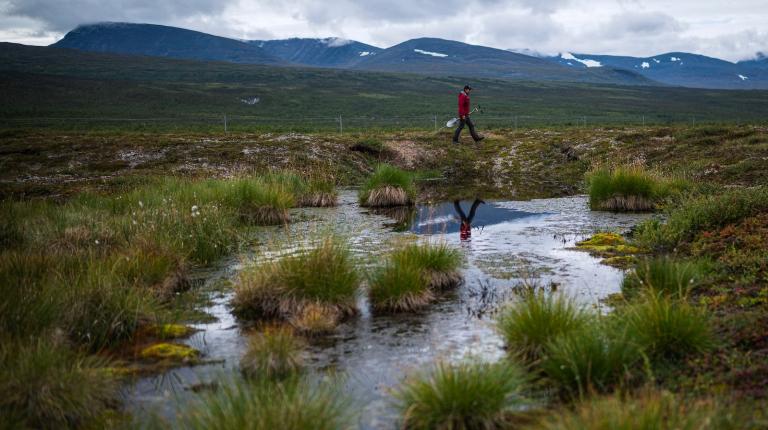Send your question to Umbra!
Q. Dear Umbra,
I hate to bother you, but I tried doing a Grist search to answer my question and nothing really turned up.
I was hoping you could recommend some environmentally aware fiction writers or books. I love Barbara Kingsolver, but have read everything of hers twice already. :) (I’d especially appreciate a recommendation for some female writers.)
Thank you!
lilacwine
Evanston, Ill.
A. Dearest lilacwine,
 Photo: timetrax23 via FlickrReaders are never a bother. Well, not usually. It is occasionally tedious to read about so many people beating themselves up over the teeniest of eco-conundrums—or beating me up for actually bothering to answer them. But yours is to wonder why, mine is to answer. Or try, as I always say.
Photo: timetrax23 via FlickrReaders are never a bother. Well, not usually. It is occasionally tedious to read about so many people beating themselves up over the teeniest of eco-conundrums—or beating me up for actually bothering to answer them. But yours is to wonder why, mine is to answer. Or try, as I always say.
Thusly, your question is a bit of fresh air—a nice momentary breather from heavy, albeit very important, environmental issues such as the massive Gulf oil spill (see the last question in this week’s column). I did a little searching through the Grist archives as well and came up with this piece from February, which reviews the novels Far North by Marcel Theroux and Primitive by Mark Nykanen—both are worth a look, for sure.
Additionally, with a little help from my fellow Gristians, I’ve compiled a list—by no means comprehensive—of some environmentally tinged fiction by both female and male authors to whet your eco-literary appetite.
- Margaret Atwood’s Oryx and Crake and its companion novel The Year of the Flood, both dystopian-future tales with genetic and biotech experiments gone awry and a massive eco and health catastrophe threatening humankind
- Jane Smiley’s A Thousand Acres, a modern retelling of King Lear and a devastating but beautifully written account of industrial farming
- Ian McEwan’s Solar, in which a Nobel prize-winning physicist struggles with his fifth failing marriage and attempts to save the planet from environmental disaster
- Vapor Trails by R.P. Siegel and Roger Saillant, about an oil exec who is unable to reconcile his financial success with the destruction he’s caused (hmm…)
- Edward Abbey’s The Monkey Wrench Gang, about a former Green Beret who returns from war to find his much-loved desert threatened by industrial development
- Ishmael by Daniel Quinn, which is about an extraordinary teacher—a gorilla—with a story to tell about how humans came to treat the earth the way they do and the possibility of a still-salvageable future
If you’re looking to simply wade rather than dive into the world of environmental fiction, I’d recommend a short story. A few that are worth a gander: A Sound of Thunder by Ray Bradbury, A White Heron by Sarah Orne Jewett, and It’s Such a Beautiful Day by Isaac Asimov.
And then there are always the much-loved classics The Little Prince by Antoine de de Saint-Exupéry and The Lorax by Dr. Seuss. Never underestimate the power of a quality children’s book: “Unless someone like you cares a whole awful lot, nothing is going to get better. It’s not.”
Bibliophile-ly,
Umbra
Q. Dear Umbra,
You might check out a funny novel by Cordelia Strube entitled Planet Reese, all about what happens to an environmentalist who short-circuits.
Barry H.
Toronto, Ontario
A. Dearest Barry,
Thanks for the suggestion. We’ll tack it onto lilacwine’s list above. Readers, here’s the skinny on this tome, per Powell’s Books:
“Reese Larkin is desperate to find the perfect mattress. His job is in jeopardy and he’s been forced to separate from his wife and children, but he believes that if he can find the ultimate sleep system his life will begin anew.
In her seventh novel, Cordelia Strube grabs readers by the neuroses with a dark but wickedly fun story about a former Greenpeace activist forced to turn marketeer who battles against a world in which he is confronted by shift mattress sales clerks, a Fred and Ginger-obsessed strip-bar waitress, derisive colleagues, and a wife who has mysteriously turned cold and is keeping his children from him. Alone in his damp basement apartment with his daughter’s hamster, he longs for a good night’s sleep and, though faced with despair, begins each day hopefully as he grips tighter to the edges of his life.”
Sounds intriguing!
Witherspoonly,
Umbra
Q. Dear Umbra,
I’ve heard that people are donating their hair to help the oil cleanup of the Gulf Coast. I’m an old-school hair farmer, and I want to know if it’s harvest time for a good cause. What do you think?
If it’s a good idea, then to whom do I send my bountiful harvest?
Hair Today, Gone Tomorrow (to a good cause)
Seattle
A. Dearest HTGT,
UPDATE: Since I wrote the answer below, Matter of Trust has posted the following to its website: “After a few days of mixed messages to the press, Ronald D. Rybarczyk, BP government and public affairs, contacted us at Matter of Trust tonight. Rybarcyzk informed us that they have a plentiful supply of ideal boom for their needs and will not be in want of donated boom or renewable fiber.” Alas, the search for a solution continues.
Props to you for your willingness to donate your locks for this hairy situation. And have I got the organization for you: Matter of Trust.
The organization, known for its oil spill hair mats, is collecting nylons, human hair, and animal fur to create hair booms to place in the water to collect oil. Here’s a great article from The Washington Post explaining the effort and its progress.
It’s important to note, though, that the oil spill has gotten way too massive to think that this approach can necessarily fix everything, but the grassroots effort has finally gotten BP’s notice—the company contacted Matter of Trust last week.
You can donate your own hair, animal fur, and nylons by signing up for Matter of Trust’s Excess Access database and then following the instructions for sending in your hair harvest.
Thanks again, HTGT. Every little bit helps.
Shornly,
Umbra



